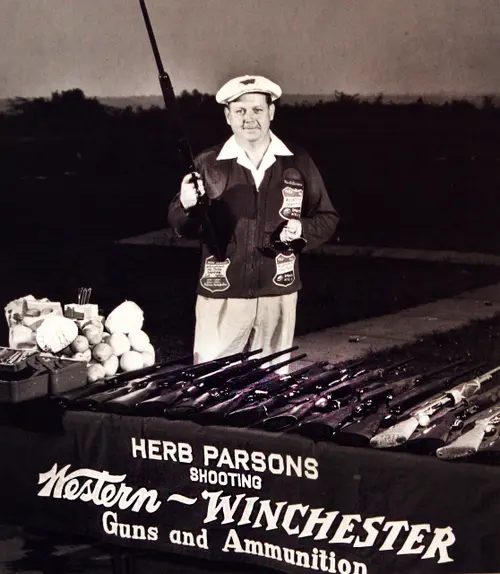150 Years of Winchester -- There's No Business Like Show Business
150 Years of Winchester -- There's No Business Like Show Business
The one and only Buffalo Bill. The element of showmanship has a long history in shooting. County fairs, circuses and traveling carnivals all provided a rapt audience — the critical element of exhibition shooting. One early showman and avid Winchester booster was William F. “Buffalo Bill” Cody, who offered his personal testimonial in the 1875 Winchester catalog, stating, “…for hunting...I pronounce your improved Winchester the boss.”
In 1883 Cody began his traveling “Wild West Show.” The show would run for the next quarter century and introduce millions around the world to the romantic icons of the quickly vanishing American West. As an action-packed spectacular, each show included cowboys, Indian attacks, stampeding buffalo, racing mustang horses and, of course, spectacular trick shooting. Thus the art of exhibition shooting was born.
Cody himself would appear in the Wild West Show’s arena, shooting glass balls with a smooth barrel Winchester Model 1873 lever-action fitted with what we would now call express sights. For theatric (and safety) reasons, Cody would use a standard rifle cartridge from which the bullet had been removed and replaced with birdshot.
Miss Annie Oakley. In 1885 an attractive young markswoman from Ohio named Phoebe Ann Mosey joined Buffalo Bill’s Wild West Show. She appeared under the stage name Annie Oakley in an act with her husband and fellow trick-shot artist, Frank Butler. Numerous Winchester rifles and shotguns were among Oakley’s favorites, both on and off the stage. She was honored by her fellow Wild West showman, the Lakota Chief Sitting Bull with the nickname of “Little Sure Shot.”
After nearly two decades on the road Annie Oakley opted for a quieter life and left the Wild West Show. She continued to set shooting records and performed in shooting exhibitions until 1924. Oakley even posted a score of 97 of 100 targets at the 1925 Grand American. She died in 1926 at the age of 66 and is now widely regarded as the first female superstar in popular American culture. The rousing musical “Annie Get Your Gun” is based on Oakley’s life story.
The Topperwein's were tops. Recognizing the marketplace value of publicity, in 1903 Winchester Repeating Arms began to employ several outstanding marksmen as “missionaries” to attend major competitions and put on shooting exhibitions using Winchester firearms, ammunition and targets. Among the early Winchester brand exhibition shooters were the husband and wife team of Adolph “Ad” and Elizabeth “Plinky” Topperwein. While learning to shoot, Elizabeth would call for a target by saying, “Throw up another one, Ad, and I’ll plink it!” Hence her stage nickname — and one possible origin of the popular shooting term “plinking.” Ad and Plinky dazzled the crowds with their feats of marksmanship at the 1904 Worlds Fair in Saint Louis, Missouri. The Fair’s organizers also included a sports festival as a minor sideshow that people were soon calling the Olympic Games.
Winchester originally hired Herb Parsons in 1929 as a salesman in Mississippi. With his exceptional marksmanship skills and smooth, outgoing personality, Winchester Repeating Arms soon had Herb shadowing Ad and Plinky to learn the finer points of exhibition shooting.
Ad Topperwein retired in 1951 and his duties fell to Parsons, who was now nicknamed “The Wizard of Winchester.” Booked solid for three years in advance, Parsons’ marksmanship was legendary among all those who saw his act, and his exploits were immortalized in a short motion picture entitled “Showman Shooter” in 1954. Parsons was well remembered for his parenting advice. “Hunt with your boy,” he said, “and you’ll never have to hunt for him.” Parsons’ career would tragically be cut short in 1959 at age 51, but in the hearts of the millions whom he entertained, Herb is still the Wizard of Winchester.






